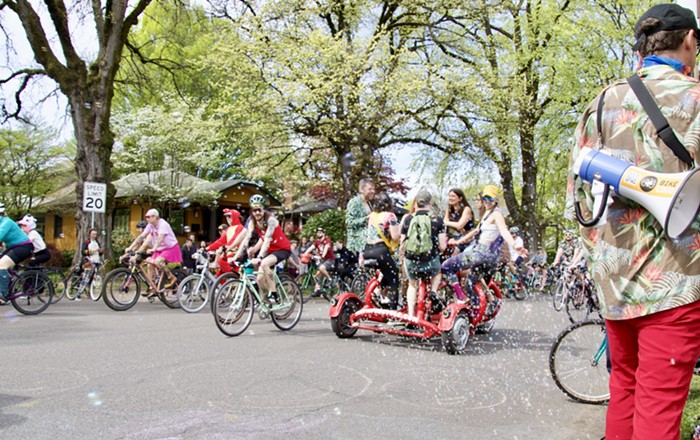Whew. So THAT was a tense meeting this morning, over at Metro's Joint Policy Advisory Committee on Transportation (JPACT), an obscure-but-powerful group that this morning decided guidelines for how to spend a $24 million pot of money that is split between bike/pedestrian projects and freight.
As we've been talking about all week, the flexible funds have historically be split with about 80 percent going to bike projects like trails and 20-ish percent going to freight. But this time around, big business like Weyerhauser, Fred Meyer and Columbia Sportswear put serious pressure on Metro to reverse the split, giving 75 percent of the money to freight and 25 percent to bike/ped. That cut would significantly reduce the amount of cash spent on bike projects in Portland, since the $19 million money from the Metro fund represents a whopping quarter of money spent on bike projects regionally.

- Bike advocates Gerik Kranksy and Mara Gross: Smiles for miles.
So! Even strong backers of bike and pedestrian projects feared the committee would decide to compromise and split to money 60/40, an approximately $7 million loss for bikes.
But in the most gripping roll call vote I've ever seen at Metro, bikes pulled out a surprise vote, with regional leaders seven to six in favor of splitting the money 75 percent to bike/ped and 25 percent to freight (three people abstained). Though it's still a cut for bikes, Bicycle Transportation Alliance advocate Gerik Kranksy and Coalition for a Livable Future's Mara Gross were elated.
"This is the most fun I've ever had!" gushed Kransky.
"... at a meeting at 7:30 in the morning," tempered Gross, grinning.
Portland City Commissioner Nick Fish (filling in on the committee for Mayor Sam Adams)had a strong explanation for his yes vote, pointing out that freight has numerous other sources of funding. "In the past decade, the region has spent $4.2 billion in roads, bridges and freight and $153 million in active transportation," said Fish. "When we invest in these kinds of projects, in particular things like trails, there's a huge return to the public."
Arguments from the pro-freight side focused on the economy and jobs. "Outside of this room, there's a recession going on," said Washington County Commissioner Roy Rogers. "We don't want this to be about a division between active and freight but frankly we need to keep this economy going."













